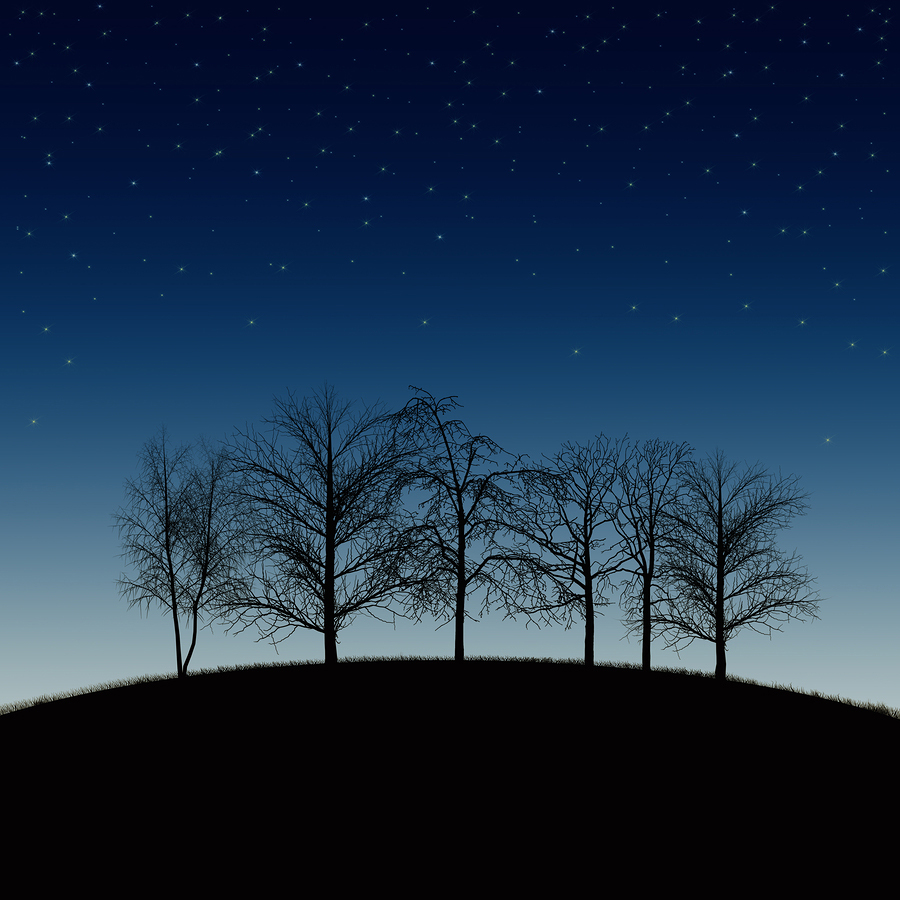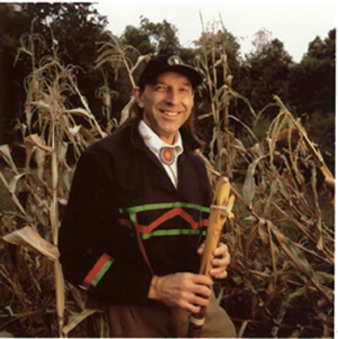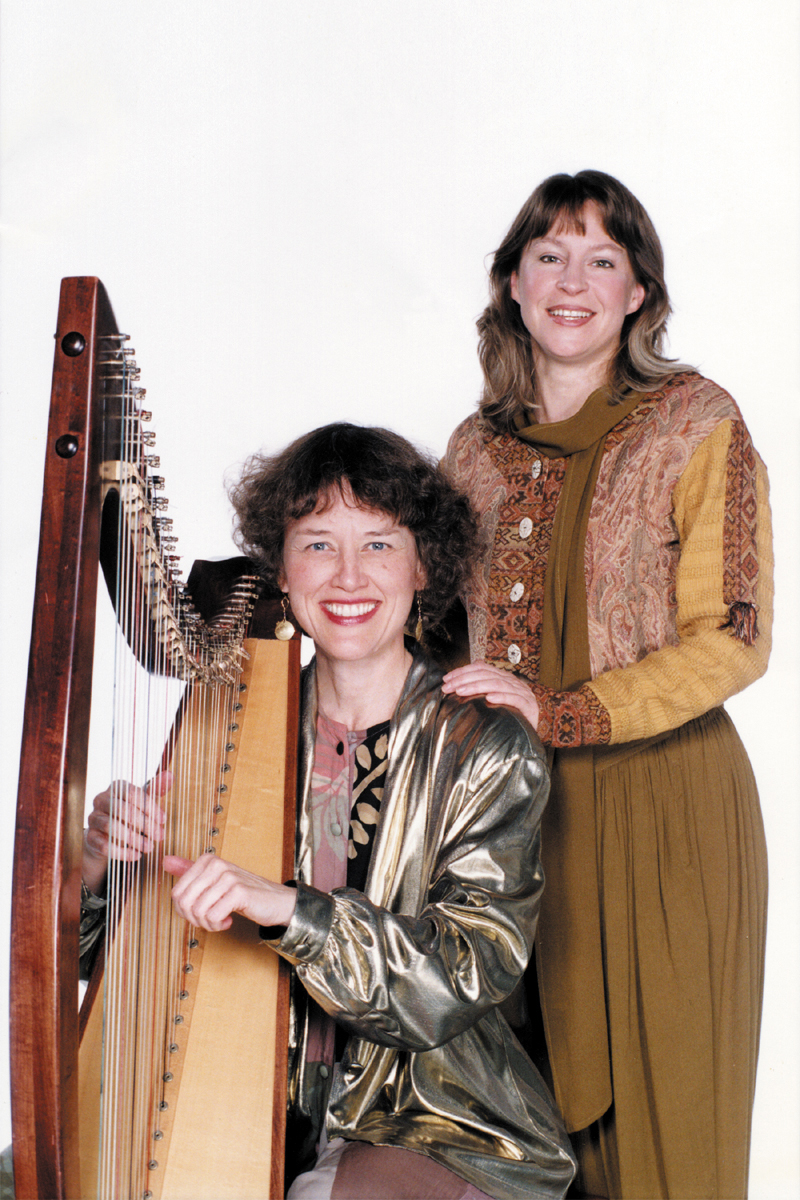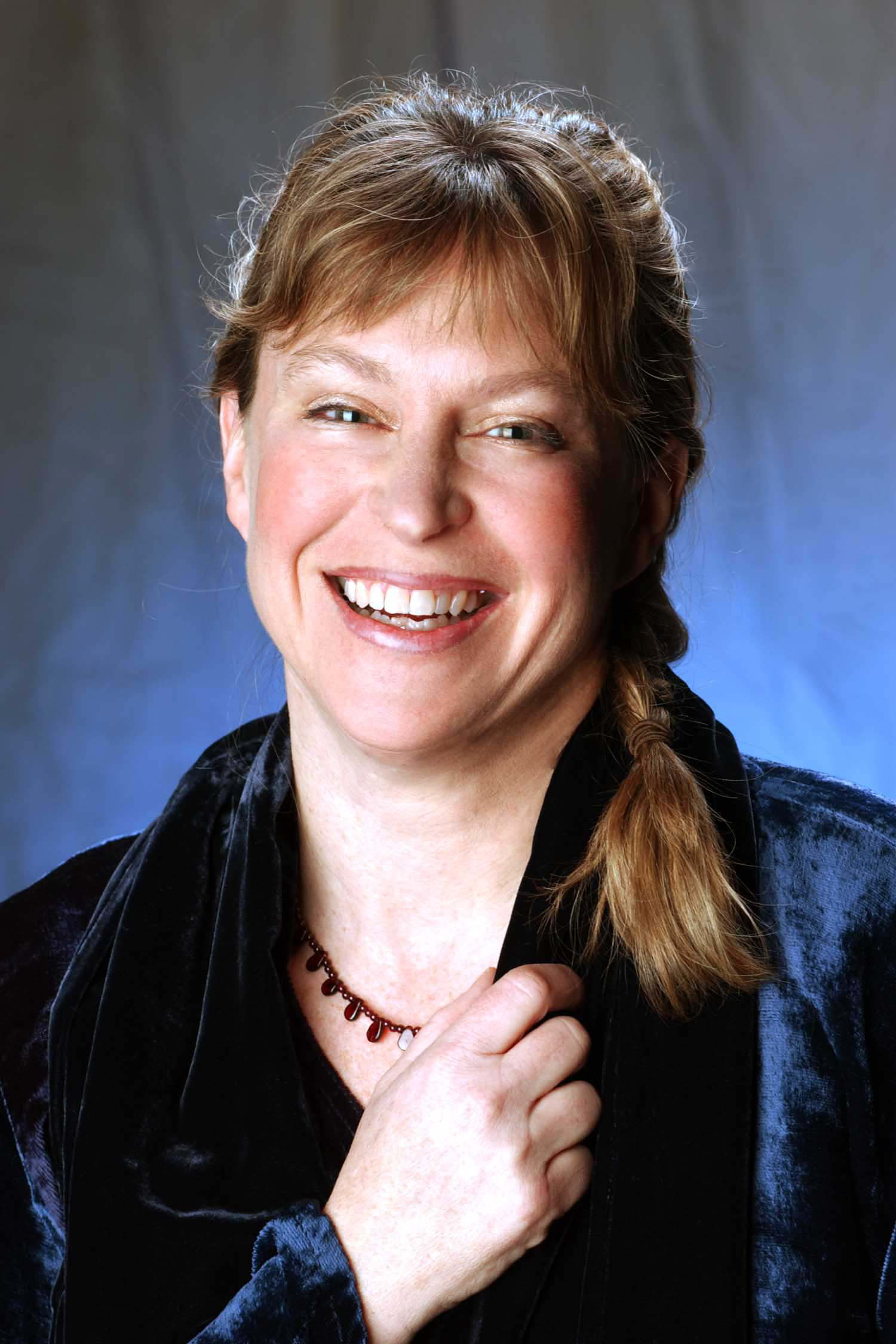Stories of the Night Sky and an English Wassail
Air Date: Week of December 23, 2022

A clear winter night (photo: bigstockphoto.org)
Writer, storyteller, and musician Joseph Bruchac offers Iroquois myths, first about the twinkling stars of the Pleiades in the winter sky and then about why life on earth continues through the long, dark nights of mid-winter. Then storyteller Diane Edgecomb shares an English tale in which barnyard animals get the last word. She closes with a Cherokee myth about the trees that stay green all winter long, the evergreens.
Transcript
CURWOOD: It's Living on Earth, I'm Steve Curwood. We continue our storytelling now with Nulhegan Abenaki storyteller, Joe Bruchac.
BRUCHAC: Long ago, the Iroquois people say there were 7 boys who wanted to do just as their fathers did. To have a special medicine lodge society. In such a lodge, they would play a drum and they would dance and sing and they would have a great feast afterward, and so they went to their parents and told them what they wanted to do. But their mothers and their fathers, they laughed at those boys: "You are too young to do this sort of thing! Go and play some other game that children play."
Those boys became very angry. They began to walk out of the village, and as they walked out, an old man was there near the edge of the village holding a drum. He said to them, "Here. You can have this drum." They took that drum, and they continued on until they reached a place on the other side of a hill and there began to dance and sing, louder and louder, so loud that the sound of their dancing and singing reached back to the village. And their mothers and fathers hearing it, said, "Who is having the meeting of a medicine lodge society? Who could that be?"
They followed the sound of the drum. They came to the hilltop and they looked down and they saw those 7 boys dancing in a circle, playing the drum and singing. But they were so angry that as they danced and sang, the power of their singing and dancing was such that their feet were no longer touching the ground. Higher and higher they danced, higher and higher. Their parents called out to them, but they continued to dance. Although it is said that one of the smallest ones looked back and fell down as a shooting star.
The others danced right up into the sky. They dance there to this day, those 7 dancing boys that are now called the Pleiades by European people. But those are those boys from long ago, whose parents did not respect them.
CURWOOD: Joe Bruchac, thanks for joining us on Living on Earth.
BRUCHAC: Mm hm. Thank you.
CURWOOD: You're a storyteller. You're a writer. You live in Greenfield Center, New York. That's in the foothills of the Adirondacks. And you’re a member the Abenaki Nation. But you also have roots in other traditions, too, right?
BRUCHAC: Yes, Slovak and English, that's also part of my ancestry.
CURWOOD: Well those all have some pretty strong oral traditions. And perhaps, not coincidentally, some long winters.

Joe Bruchac
BRUCHAC: Well, winter is the time for telling stories in many traditions, especially for the Native people of this continent. Because the days were very short and the nights were very long, it was a good time to tell stories. And you would need a good story to get you through those long nights. It's also true that the stories were not supposed to be told in the summer. For example, a good story is so powerful that everything wants to listen to it, including the snakes who are awake in the summer time. So if you don't want snakes in your house, you don't tell these traditional stories when the days are long.
CURWOOD: (Laughs) Okay. What gave you this bug? Why do you tell stories?
BRUCHAC: I was raised by my grandparents. And although my grandfather, who is Abenaki Indian, did not tell traditional stories, he ran a little general store and a gas station and people would come there and sit around the potbellied stove and trade tall tales. Usually from the Adirondack traditions. And I think if you grow up around elders and you listen, in a way you can't help but become a storyteller.
CURWOOD: Anything else you want to tell us from your Native American tradition?
BRUCHAC: This is a story that again comes from the Iroquois people. The great midwinter ceremony takes place traditionally at the solstice time of the year, although nowadays it takes place in January. They've moved it so it doesn't compete with Christmas. And at that solstice time, when the 7 dancing stars are in the exact center of the sky, they play a game called the bowl game in which you put a number of stones, painted black on one side and white on the other, into the bowl, shake it, and depending on how they come up facing black or white, you either score a point or you fail.
The story goes that long ago, Grandmother Moon looked down on the Earth and was not happy with what she saw. She said, "Life on Earth must end." Now the good mind, who was always a defender of the people, he said to his grandmother, "Grandmother, is there no way we can prevent this from happening? She said to him, "I will tell you what. We will play the bowl game and the one who wins will decide whether or not life will continue."
So the good mind went to the chickadees. He said to them, "My friends, I want you to help me." And he told them what he needed. And they said, "Of course. You can borrow our heads, which are black on one side and white on the other, put them in the bowl, and we will do what we can." So when the good mind took the bowl and he shook it, the chickadees flew up, their heads flew up looking just like little black and white stones, singing in mid-air. They flew around and then they landed and gave him a perfect score.
So it was that he won, and life on Earth continues. And so it is to this day that in the middle of the winter, you could hear the chickadees singing and celebrating the continuance of life.
CURWOOD: I guess I'll never look at the chickadee the same way again. You know, Joe, one thing that always intrigues me about Native American stories is and those from other traditional cultures is the way that you see the natural world in sort of human terms. Anthropomorphic, I think, is the long word. That the elements, that animals and plants have human qualities. And that's very different from the way that we generally see things in the modern world.
BRUCHAC: Well, the thing about traditional stories is that they remind us everything is alive and deserving of respect. And those stories have on the one hand the purpose of entertainment, but the reason they entertain is so that the lessons they teach will come across that much stronger. So if animals and plants are seen as being the equal and just as important as human beings, we're teaching a lesson that we need for survival. That was how my ancestors see it, and that is how I still see it to this day.
CURWOOD: Joe, we're just about out of time, but I saw you brought your beautiful drum. Could you do something with that for us?
BRUCHAC: What I want to share with you is actually a tradition from the Abenaki people, a tradition that is still carried out to this day. At this time of year, the December solstice, it was the time when people went from house to house greeting each other. And what they would say when they greeted each other this time, what they would say was, "Anhaldam mawi kassipalilawalan." Which means, "Forgive me for any wrong I may have done you in the past year." And that was then followed by a friendship song and a friendship dance bringing the people together, back into the circle of life, forgiveness and respect restored. So I want to share with you that traditional friendship song. And its translation is very simple. It basically says, "I like this, and I like that." And that idea of caring for the people and the living things around you is at the center of the friendship song.
(Beats drum) We gai waneaaaa, we gai waneaaa, we gai waneaaaa, we gai waneaaa...
CURWOOD: Joe Bruchac, thank you very much.
BRUCHAC: Wliwini, thank you.
CURWOOD: Joe Bruchac is a storyteller from New York State. He's also the coauthor, with Michael Caduto, of Keepers of Life: Discovering Plants Through Native American Stories and Earth Activities for Children.
[MUSIC BREAK: Morning Star by Kevin Locke]
CURWOOD: With us now in the studio is a horse goddess. Hello.
EDGECOMB: (Laughs) Neeeeeigh!
CURWOOD: Actually, this is Diana Edgecomb and she's a horse goddess and all kinds of things as she tells her stories. Thanks for joining us.
EDGECOMB: Hello. It's a pleasure to be here, Steve.
CURWOOD: Well, you use stories to explore the human connection to the natural world, and our estrangement from nature. That's why we've invited you here to the show. Tell us about the story you're going to tell now.
EDGECOMB: This first story I would like to share is actually collected by Ruth Tong, and she collected it from a man in Pittminster in England. And it's a Wassail story. And within the story there is a tree spirit called the Apple Tree Man, which we don't encounter very often now. But the Apple Tree Man was always responsible for the fertility of the entire orchard, so you can see that the Apple Tree Man was very important.
CURWOOD: Oh, yes.
EDGECOMB: And in the old days, instead of just Wassailing each other and getting drunk, people would actually do something to ensure the fertility of the orchard. They would have Wassail traditions. And include the natural world.
CURWOOD: Okay, well I'm ready if you are.
EDGECOMB: (Laughs) Yes, I am.
(Harp music plays; women sing: "Wassail, Wassail, all over the town. Our toast, it is white and our ale it is brown. Our bowl, it is made of the white maple tree. With a Wassailing bowl we'll drink to thee. Drink to thee! Drink to thee! With a Wassailing bowl we'll drink to thee.)
EDGECOMB: This is a tale of a hard-working chap, eldest in a big family, see? And so, when his dad die, there weren't nothin' left for he. Youngest gets it all! And youngest do give bits and pieces to all his kith, but youngest don't like eldest. All he do give eldest is his dad's old donkey, and an ox that was so skinny it was pretty much gone to anatomy. And his grandfer's old tumble-down cottage with its two dree ancient old apple trees. Only problem is, cottage doesn't have any roof. Only problem is, apple trees don't bear no fruit. But eldest don't grumble. No, sets to work. And he cuts the grass along the lane and feeds it to donkey and donkey starts to fatten. And he rubs old ox with the herbs and says the words for healing. And ox do pick himself up and walk smart. And then the eldest do turn those two beasties out into the orchard. And then those old apple trees flourish a-marvel.
Well one day, into the orchard came the youngest, and he says, " 'Twill be Christmas Eve come tomorrow when all the beasts do talk at midnight. Now I've heard tell and you've heard tell that there's a treasure buried hereabouts. And I'm set. I'm going to ask your donkey where the treasure is buried, and he mustn't refuse to tell me the truth, not on Christmas Eve. Now eldest, you wake me up just afore midnight. I'll take a whole sixpence off your rent."
Come Christmas Eve, the eldest don't forget the animals. He gives old ox and donkey a bit extra. And he fixes a bit of holly in the stables. And then he takes his last mug of cider, and he warms it and mulls it by the fire. And when it's warm and inviting, he outs to the orchard to Wassail the old apple tree. (A flute plays.) (Sings:) "Old apple tree, we'll Wassail thee, and hoping thou wilt bear. The Lord shall know what we shall need to be merry another year. So grow well and so bear well and so merry let us be. That everybody lift up a cup (Laughs) here's health to the old apple tree!" And he takes and throws the last of the cider on the old apple tree. "Good health to you, old apple tree!" And the Apple Tree Man within the tree, he looks out and speaks to the chap. You take a look under this girt didicki root of ours."
So the eldest looks under that girt didicki root. And the hard earth moves aside like it's sand. And he finds a small box, and within it, golden coins.
"You take it, and hide it, and bide quiet about it. 'Tis yours and no one else's."
So eldest does just that. And when he's finished, it's almost midnight. And he goes to wake up his dear younger brother. Well his younger brother wakes up and he's all in a hurry, push. He rushes out in his nightshirt with his hair all every which way. And sure enough, when he gets to the stables, the donkey is a-talkin' to the ox: "You know this girt greedy fool? A-listenin' to us so unmannerly? He do what we should tell him where the treasure is."
"And that's where he's never gonna get it," say the ox. "For somebody have a-tooked it already."
And the two animals, in concert, lifted their tails.
(Harp music plays. Women sing: "Oh here's to the ox and to his right horn. Pray God send my master a good crop of corn. And a good crop of corn that may we all see. With a Wassailing bowl we'll drink to thee. Drink to thee! Drink to thee! With a Wassailing bowl we'll drink to thee.")

Diane Edgecomb and accompanist Margot Chamberlain (Photo: Stephen Cicco)
CURWOOD: Well, that was terrific! Thank you. Diane Edgecomb is our guest here. She's a storyteller. I love stories, of course being in radio. In the news business, even, we call it a story; it gets edited. I think it's an essential part of us as human beings to tell these stories. But you tell stories about nature. Why in particular stories about nature?
EDGECOMB: Well, I think storytelling is such a connecting medium, and it really was a way for me to bring children and other people into a different relationship to nature through story. I could teach children, you know, the names of different birds and animals and processes. And stories are really the smallest unit of meaning, too, so I could in a way try and get them to see new meanings in the natural world.
CURWOOD: But much of your repertoire actually is for adults.
EDGECOMB: Yes. I think that that's because I'm also trying to make links for myself. Once I grew up and stopped climbing trees and building forts and I felt this loss of connection. And I had a few experiences, I think, that made me realize that I could find a medium, which turned out to be storytelling, that I could use to reconnect myself, and that needed to be in an adult form through seasonal folktales.
CURWOOD: Seasonal folk tales. Now, Joe Bruchac has just told us that the winter time invites storytelling. You're saying that adults need stories to unfreeze us in some fashion?
EDGECOMB: Yes. And the Wassail bowl can unfreeze you, too. (Laughs). But yes, a sense of community is really established through that, because it's not just the storyteller creating the story. It's the entire group of people having these images live in their mind's eye.
CURWOOD: Diane Edgecomb, we have time for just one more story. Do you have one that you could tell us?
EDGECOMB: I would really love to tell this Cherokee myth. It's a beautiful one for this time of year, and when I'm driving down the highway and I see the poor trees with no leaves and I see a few evergreens, I think of this story and I hope other people will as well.
When the plants and the trees were first created, they were given a task: to stay awake for 7 days and 7 nights. Now the first day and night, all of the plants and trees stayed wide awake and the second night as well. But by the third night, and the dawning of the fourth day, many of the small plants and some of the trees were falling fast, fast asleep. Who would be able to stay awake for 7 days and 7 nights?

Diane Edgecomb
But on the seventh night, and the dawning of the eighth day, there stood the cedar, the pine, the spruce, and fir, the hemlock, the holly, and the laurel. "You have endured," a voice said, "and you shall be given a gift. All of the other plants and trees will lose their leaves and sleep the winter long, but you shall never lose your leaves. You will provide a shelter to the birds during the harshest winds, and you will remind the people that even during the darkest times something remains. You shall be evergreen."
CURWOOD: Thank you very much. Diane Edgecomb is a storyteller. Thanks for coming by with your accompanist, Margo Chamberlain. Thank you so much for joining us.
EDGECOMB: Thank you very much for bringing us here.
Links
Living on Earth wants to hear from you!
Living on Earth
62 Calef Highway, Suite 212
Lee, NH 03861
Telephone: 617-287-4121
E-mail: comments@loe.org
Newsletter [Click here]
Donate to Living on Earth!
Living on Earth is an independent media program and relies entirely on contributions from listeners and institutions supporting public service. Please donate now to preserve an independent environmental voice.
NewsletterLiving on Earth offers a weekly delivery of the show's rundown to your mailbox. Sign up for our newsletter today!
 Sailors For The Sea: Be the change you want to sea.
Sailors For The Sea: Be the change you want to sea.
 The Grantham Foundation for the Protection of the Environment: Committed to protecting and improving the health of the global environment.
The Grantham Foundation for the Protection of the Environment: Committed to protecting and improving the health of the global environment.
 Contribute to Living on Earth and receive, as our gift to you, an archival print of one of Mark Seth Lender's extraordinary wildlife photographs. Follow the link to see Mark's current collection of photographs.
Contribute to Living on Earth and receive, as our gift to you, an archival print of one of Mark Seth Lender's extraordinary wildlife photographs. Follow the link to see Mark's current collection of photographs.
 Buy a signed copy of Mark Seth Lender's book Smeagull the Seagull & support Living on Earth
Buy a signed copy of Mark Seth Lender's book Smeagull the Seagull & support Living on Earth

